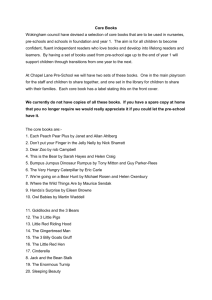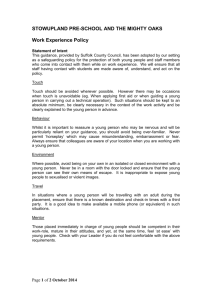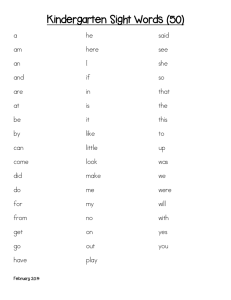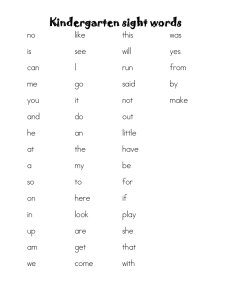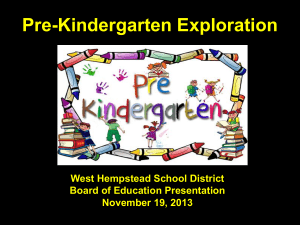Chemistry as a subject in the kindergarten education M. Hill 1 2
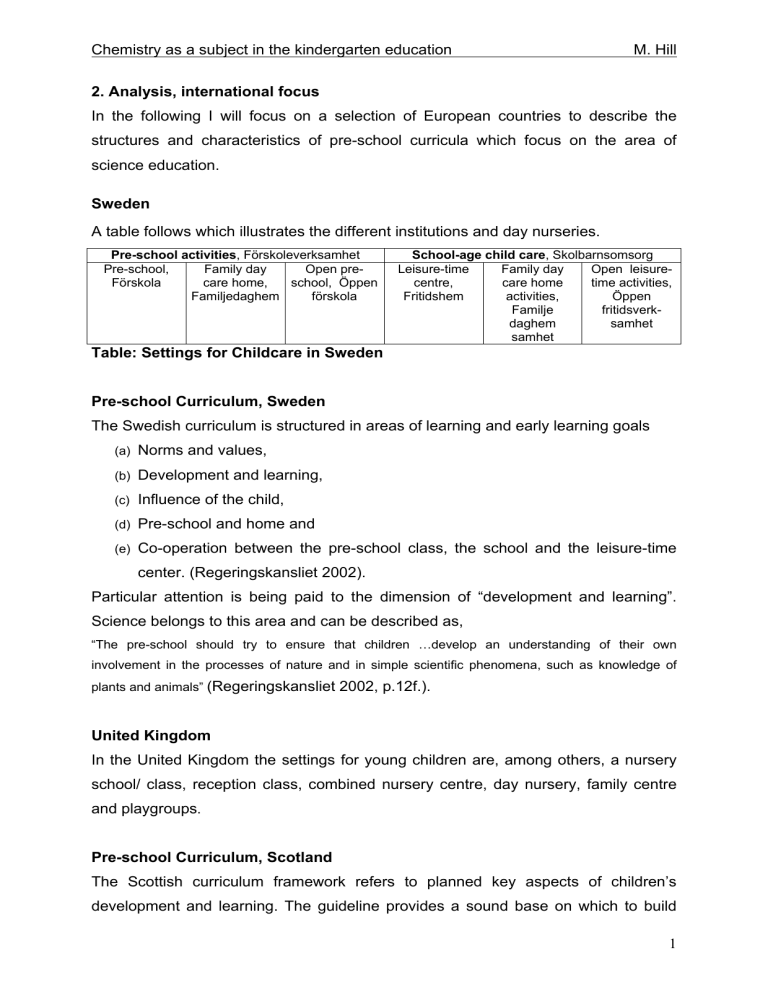
Chemistry as a subject in the kindergarten education M. Hill
2. Analysis, international focus
In the following I will focus on a selection of European countries to describe the structures and characteristics of pre-school curricula which focus on the area of science education.
Sweden
A table follows which illustrates the different institutions and day nurseries.
Pre-school activities , Förskoleverksamhet
Pre-school,
Förskola
Family day care home,
Familjedaghem
Open preschool, Öppen förskola
Table: Settings for Childcare in Sweden
School-age child care , Skolbarnsomsorg
Leisure-time centre,
Fritidshem
Family day care home activities,
Open leisuretime activities,
Öppen
Familje daghem samhet fritidsverksamhet
Pre-school Curriculum, Sweden
The Swedish curriculum is structured in areas of learning and early learning goals
(a) Norms and values,
(b) Development and learning,
(c) Influence of the child,
(d) Pre-school and home and
(e) Co-operation between the pre-school class, the school and the leisure-time center. (Regeringskansliet 2002).
Particular attention is being paid to the dimension of “development and learning”.
Science belongs to this area and can be described as,
“The pre-school should try to ensure that children …develop an understanding of their own involvement in the processes of nature and in simple scientific phenomena, such as knowledge of plants and animals” (Regeringskansliet 2002, p.12f.).
United Kingdom
In the United Kingdom the settings for young children are, among others, a nursery school/ class, reception class, combined nursery centre, day nursery, family centre and playgroups .
Pre-school Curriculum, Scotland
The Scottish curriculum framework refers to planned key aspects of children’s development and learning. The guideline provides a sound base on which to build
1
Chemistry as a subject in the kindergarten education M. Hill coherent, continous and progressive educational experience for all young people in
Scotland. The curriculum framework helps staff to plan activities and experiences that promote children´s development and learning in
(a) personal, social and emotional development,
(b) communication and language,
(c) knowledge and understanding of the world,
(d) expressive and aesthetic development and
(e) physical development and movement. (Learning and Teaching Scotland 2002, p.5).
The dimension that focusses on science education is part of “knowledge and understanding of the world”.
Pre-school Curriculum, Northern Ireland
Given children needs, it follows that young children require a curriculum which
•
meets their physical, social, emotional and cognitive needs at their particular stage of development;
•
motivates,
•
is broad and balanced, allowing children to make choices and providing them with opportunities, through play and other experiences, to develop the learning associated with
(a) Personal, social and emotional development,
(b) Physical development,
(c) Creative/ aesthetic development,
(d) Language development,
(e) Early mathematical experiences,
(f) Early experiences in science and technology and
(g) Knowledge and appreciation of the environment. (Vgl. CCEA 1997, p.7).
Topics dealt with in science are included in the curriculum of the category of “Early
Experiences in Science and Technology”, (CCEA 1997, p.7). Further aspects of science are mentioned in “Knowledge and Appreciation of the Environment ” (CCEA
1997, p.21). The descriptions of progress in learning in these areas are based on a thesis, “Most children are interested in and curious about living things. They should be given guidance on how to care for plants and animals, and encouraged to consider the needs of others in the envrionment.” (CCEA 1997, p.14).
2
Chemistry as a subject in the kindergarten education M. Hill
Curriculum guidance for the foundation stage, England
The curriculum guidance for the foundation stage includes:
(a) Personal, social and emotional development,
(b) Communication, language and literacy,
(c) Mathematical development,
(d) Knowledge and understanding of the world,
(e) Physical development and
(CCEA/DfEEE 2000, p.5).
For each of the six areas of learning, additional guidance is given on learning and teaching. This highlights those things which practioners need to give particular attention to in that area of learning.
“Knowledge and Understanding of the World” allows effective planning for science education. The curriculum should underpin all future learning by supporting, fostering, promoting and developing children´s knowledge and understanding of the world, “with opportunities for all children to solve problems, make decisions, experiment, predict, plan and question in a variety of contexts, and to explore and find out about their environment and people and places that have significance in their lives;“ (QCA/DfEE 2000, p.9).
Science in the kindergarten curriculum
Sweden: “ Development and
Learning”
Northern Ireland: “Early
Experiences in Science and
Technology; Knowledge and
Appreciation of the Environment”
Scotland: “Knowledge and
Understanding of the World”
England and Wales: “Knowledge and Understanding of the World”
Austria
Germany: “Science” at the foundation stage or “Mathematics and Science”
(“Naturwissenschaftliche
Grunderfahrungen oder
Mathematik und Wissenschaft”)
Science education for kindergarten teachers
“Nature and Enviroment” (20 weeks), three units. Additionally the subject of “Mankind, Nature and
Enviroment” (3rd semester, 5 units). The whole course includes
120 credits, from which 10 units may include science
Obligatory are “English,
Mathematics, Science as well as
Technology”.
“Pysics, Chemistry, Biology,
Environmental Studies and Health
Studies”.
“Biology, Health Studies, Science”.
The timeframe makes up between
3-10% of the whole educational subjects.
Standard of education of prospective practioners
Pre-school teachers for early childhood
Education: 3 years of teacher training
(6 semesters) at a university, or at a faculty of “Children and Youth Studies“
Teachers for primary and secondary education
Education: 4 years at a college of education.
Teachers for the pre-school and elementary level
Education: 4 years at a university
Teachers for pre-school and primary education
Education: 4 years at a university
KindergärtnerIn
Education: 5 years at a
”Bildungsanstalt für
Kindergartenpädagogik“
ErzieherIn
Education: 3 years at a school for social pedagogy. Since april 2004 the only kindergarten education course has been established at the Alice
Salomon University of Applied
Sciences Berlin (“Bachelor of Arts“).
Table: International Comparison of Science in Kindergarten Education
3
